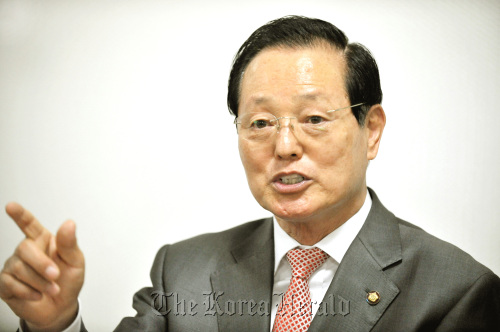
Rep. Cho Jin-hyeong of the Grand National Party talks in a recent interview with The Korea Herald. (Yang Dong-chul/The Korea Herald)
Pending bills must be passed to ensure the 7 million Korean citizens overseas can exercise their political rights, a ruling party lawmaker has said.
“We don’t have much time left until this November when overseas Koreans are to begin registering as voters,” Rep. Cho Jin-hyeong of the Grand National Party said in a recent interview with The Korea Herald.
“Though we cannot expect everything to be perfect right from the start, it is vital to deal with important pending issues by then.”
Cho, a third-term lawmaker and former chairman of the parliamentary administrative committee, has long worked on the overseas voting system. He currently chairs the party’s overseas nationals’ committee.
The committee kicked off in 2009 as the revision bill of the public office election law passed the National Assembly, obligating the government to offer voting rights to overseas nationals.
From next year’s general elections, Korea is to become the 118th country in the world and the last OECD member to implement overseas voting, according to Cho.
Because political parties are legally banned from setting up overseas branches, most of their campaigns targeting Koreans living abroad are expected to take place on the internet.
“The committee holds close ties with overseas Korean communities and has submitted several supplementary bills based on their feedback,” said Cho.
One of his two proposed bills ― among the dozen currently pending in the assembly ― calls for allowing overseas voters to register by mail or online, without actually visiting regional diplomatic and consular offices.
The other bill includes the provision of transportation to voters who live far from the designated balloting stations.
“A total of 167 diplomatic establishments will be used for overseas voting. However, the number is insufficient to enable every Korean national throughout the world to cast their ballot,” he said.
“Additional polling stations must be set up in those areas with a dense Korean population. Those who live in remote regions should be provided with means of transportation to voting booths.”
There are concerns about election administrative expenses but it is one of the state’s duties to guarantee voting rights to its nationals no matter the cost, Cho added.
“The government sought to have overseas voting bills passed in the June parliamentary session, which failed to deal with them,” he said.
“So, it has become very important to resolve at least top priority matters in the upcoming September session.”
One of the toughest obstacles is getting lawmakers reach a consensus, Cho said.
“Controversies existed on whether it is right to grant voting rights to those who do not pay taxes to the Korean government,” he said.
Parties have different positions on overseas voters.
“Overseas Koreans tend to be politically conservative as they take more interest in the economic and diplomatic development of the country in general rather than domestic welfare issues,” the GNP lawmaker said.
“This is why some within liberal opposition parties seem reluctant to accept the new system.”
Even some GNP lawmakers expressed concerns that the votes may divide overseas Korean communities into political factions.
Despite skepticism and some lawmakers’ reluctance, Cho remained optimistic about the proceedings.
“A budget of 8 billion won ($7.5 million) was allocated to preparing for overseas voting this year, and the National Election Commission is planning to request 99.8 billion won next year, considering the scheduled elections,” he said.
“The government, for one, is responding actively to the feedback they gathered from participants in the past two mock elections.”
Tough steps are on board to block voting illegalities, he added. One of them is to invalidate the passports of those who violate the election law.
“The overseas election system is not merely a matter of voting, but part of the state’s long-term project to promote its international image and to strengthen ties with its brethren living abroad,” Cho said.
By Bae Hyun-jung (tellme@heraldcorp.com)






